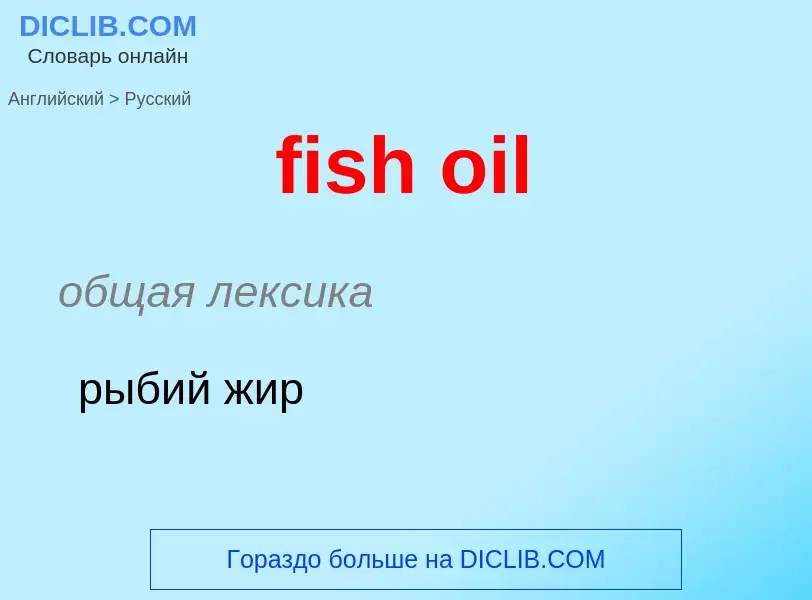Vertaling en analyse van woorden door kunstmatige intelligentie ChatGPT
Op deze pagina kunt u een gedetailleerde analyse krijgen van een woord of zin, geproduceerd met behulp van de beste kunstmatige intelligentietechnologie tot nu toe:
- hoe het woord wordt gebruikt
- gebruiksfrequentie
- het wordt vaker gebruikt in mondelinge of schriftelijke toespraken
- opties voor woordvertaling
- Gebruiksvoorbeelden (meerdere zinnen met vertaling)
- etymologie
fish oil - vertaling naar russisch
общая лексика
рыбий жир
['fifɔil]
существительное
общая лексика
рыбий жир
Definitie
---
Радий Геннадиевич (р. 1924), русский писатель, литературовед. Критические работы: "Назым Хикмет" (1960), "Джалалиддин Руми" (1972) и др. Книги прозы: "Иду с тралом" (1966), "Турецкие дневники: Встречи. Размышления" (1977), "Однажды непременно" (1984) и др.
Wikipedia

Fish oil is oil derived from the tissues of oily fish. Fish oils contain the omega-3 fatty acids eicosapentaenoic acid (EPA) and docosahexaenoic acid (DHA), precursors of certain eicosanoids that are known to reduce inflammation in the body and improve hypertriglyceridemia. There has been a great deal of controversy in recent years about the role of fish oil in cardiovascular disease, with recent meta-analyses reaching different conclusions about its potential impact. The most promising evidence supports supplementation for prevention of cardiac death.
Fish oil and omega-3 fatty acids have also been studied in a wide variety of other conditions such as clinical depression, anxiety, cancer, and macular degeneration, yet their benefit in these conditions has also not been verified.
The fish used as sources do not actually produce omega-3 fatty acids. Instead, the fish accumulate the acids by consuming either microalgae or prey fish that have accumulated omega-3 fatty acids. Fatty predatory fish like sharks, swordfish, tilefish, and albacore tuna may be high in omega-3 fatty acids, but due to their position at the top of the food chain, these species may also accumulate toxic substances through biomagnification. For this reason, the United States Environmental Protection Agency recommends limiting consumption (especially for women of childbearing age) of certain (predatory) fish species (e.g., albacore tuna, shark, king mackerel, tilefish and swordfish) due to high levels of the toxic contaminant mercury. Dioxins, like PCBs and chlordane, as well as other chlorinated cyclodiene insecticides are also present. Fish oil is used in aquaculture feed, in particular for feeding farmed salmon.
Marine and freshwater fish oil vary in contents of arachidonic acid, EPA and DHA. The various species range from lean to fatty, and their oil content in the tissues has been shown to vary from 0.7% to 15.5%. They also differ in their effects on organ lipids. Studies have revealed that there is no relation between either 1) total fish intake or 2) estimated omega−3 fatty acid intake from all fish and serum omega−3 fatty acid concentrations. Only fatty fish intake, particularly salmonid, and estimated EPA + DHA intake from fatty fish has been observed to be significantly associated with increase in serum EPA + DHA.
As of 2019, the US Food and Drug Administration (FDA) has approved four fish oil-based prescription drugs, namely Lovaza, Omtryg (both omega-3 acid ethyl esters), Vascepa (ethyl eicosapentaenoic acid), and Epanova (omega-3 carboxylic acids). Notably, none of these drugs is actually fish oil: they are all derivatives of acids found in fish oil.


![Fish oil rendering in [[Port Dover, Ontario]], 1918 Fish oil rendering in [[Port Dover, Ontario]], 1918](https://commons.wikimedia.org/wiki/Special:FilePath/FMIB 36337 Rendering Room where the Fish Waste was Treated to Separate the Valuable Oil Content, Port Dover, Ont.jpeg?width=200)
![Kepler [[Cod Liver Oil]] with Malt Extract Kepler [[Cod Liver Oil]] with Malt Extract](https://commons.wikimedia.org/wiki/Special:FilePath/Kepler Cod Liver Oil, by Burroughs Wellcome & Co Wellcome L0016947.jpg?width=200)

